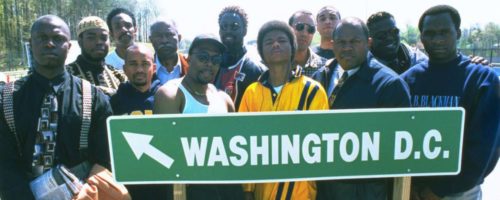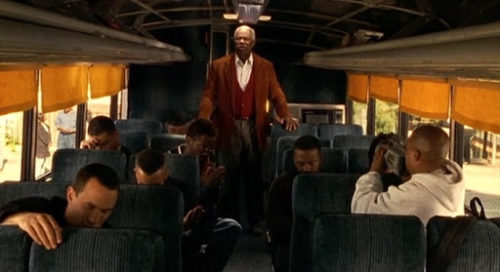
At the heart of Spike Lee’s travelogue Get on the Bus is a message that politics can’t save our communities. Ultimately, we need dads to be dads to their kids, whatever that looks like. Though he tends to lean left in his politics, this rarely touted 1996 film retains a fairly conservative message that “it all begins with the family.” Religious undertones run rampant throughout the film, beginning with the opening scene where we see a caravan of pilgrims board a bus in front of a South Central AME church bound for the Million Man March.
The first passengers we meet are a father and son who are literally shackled together via a 72-hour court order for a misdemeanor committed by Evan Jr. Evan Sr.’s strained relationship with his son threads the narrative, as we navigate the intersecting story lines of the aspiring film student documenting the journey: the self-absorbed actor (Andre Braugher) who boasts he will one day exceed Denzel Washington’s glory; the Black Republican who argues in favor of Black self-sufficiency; and Jeremiah (Ossie Davis), an elderly man jaded by his experience in corporate America and seeking to atone for having missed the 1963 March on Washington.

This is not a political film per se, but the 1995 Million Man March serves as a backdrop for a more personal and intimate portrait of a journey to the heart each passenger on the Spotted Owl takes as he wrestles with his specific place in the Black community, what it means to be a Black man in America, and for some of them, where they stand before God. If School Daze examined a swath of Black culture from a diagnostic perspective, airing Black America’s dirty laundry, Get on the Bus takes a more introspective and spiritually implicit approach that offers a semblance of hope.
In the film’s final shot, we see that the father and son have abandoned their shackles (literally and symbolically) in front of the Lincoln Memorial, signifying the reality that though Lincoln allegedly “freed” the slaves, in multiple ways, Black people still experience bondage. Our communities suffer from the prevalence of mass incarceration, a degree of paternal absence, and economic and educational disparities. Slavery’s most enduring legacy though was the psychological toll it had on people of color, crippling our sense of dignity. Dr. Martin Luther King, Jr., aptly assessed this damage in one of his lesser known speeches, “Where Do We Go From Here?”:
As long as the mind is enslaved, the body can never be free. Psychological freedom, a firm sense of self-esteem, is the most powerful weapon against the long night of physical slavery. No Lincolnian emancipation proclamation or Johnsonian civil rights bill can totally bring this kind of freedom. The negro will only be free when he reaches down to the inner depths of his own being and signs with the pen and ink of assertive manhood his own emancipation proclamation. And, with a spirit straining toward true self-esteem, the Negro must boldly throw off the manacles of self-abnegation and say to himself and to the world,
I am somebody. I am a person. I am a man with dignity and honor. I have a rich and noble history. How painful and exploited that history has been. Yes, I was a slave through my foreparents and I am not ashamed of that. I’m ashamed of the people who were so sinful to make me a slave.Yes, we must stand up and say,I’m black and I’m beautiful,and this self-affirmation is the black man’s need, made compelling by the white man’s crimes against him.
 MLK also delivered his famous “I Have a Dream” speech in front of this memorial at the March on Washington, after which Lyndon Johnson would later sign into law the 1964 Civil Rights Act. However, many feel as though the policies LBJ put forward did little to nothing to help the black community and in many ways reinforced the broken family structure that continues to perpetuate many of our socio-economic issues.1 While there’s enough data to strongly indicate that the presence of a father is critical to a child’s development, the father-son relationship can’t be mandated. It has to begin with self-examination and taking personal responsibility for our failures and shortcomings as fathers—or as Michael Jackson sings in the opening title sequence, You’ve gotta put your heart on the line, if you want to make it right.
MLK also delivered his famous “I Have a Dream” speech in front of this memorial at the March on Washington, after which Lyndon Johnson would later sign into law the 1964 Civil Rights Act. However, many feel as though the policies LBJ put forward did little to nothing to help the black community and in many ways reinforced the broken family structure that continues to perpetuate many of our socio-economic issues.1 While there’s enough data to strongly indicate that the presence of a father is critical to a child’s development, the father-son relationship can’t be mandated. It has to begin with self-examination and taking personal responsibility for our failures and shortcomings as fathers—or as Michael Jackson sings in the opening title sequence, You’ve gotta put your heart on the line, if you want to make it right.
Vulnerability can be difficult for men, especially in a culture that implicitly defines masculinity in terms of strength and self-reliance. While the gospel frees us from having to maintain the defenses that make intimate relationships impossible, it’s not a guaranteed cure-all for the inter-generational dissonance that can exist between fathers and sons. The gospel gives us Christ, who assumed culpability for all our transgressions including our inability to “be perfect as your Father in heaven is perfect.” In Jesus, the yoke of slavery is decisively broken and we are bound to the heavenly Father, not by law, but by grace. As St. Paul wrote in Galatians,
when the set time had fully come, God sent his Son, born of a woman, born under the law, to redeem those under the law, that we might receive adoption to sonship. Because you are his sons, God sent the Spirit of his Son into our hearts, the Spirit who calls out, ‘Abba, Father.’

COMMENTS
2 responses to “Get on the Bus: Fatherhood, Redemption, and Grace”
Leave a Reply













Really powerful, Jason. I need to re-watch, but I remember Braugher being amazing at being obnoxious. Pretty sure that MJ song was something he wrote specifically for the film, which is something he almost never did.
Jason, another fantastic piece. You plainly get the father-son dissonance and how it replays in so many registers and I always come away from your posts with relief for the bout of it I’m undergoing at the time. Thank you!